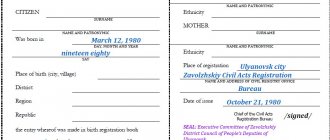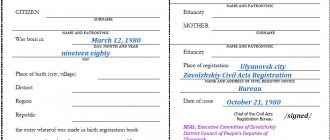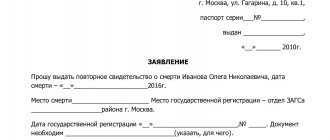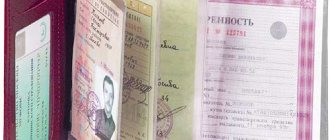2
The entry of a court decision on adoption is not the last stage. Now adoptive parents must contact the civil registry office to make changes to the deed record. All changes are carried out solely by court decision. Adoptive parents do not have the right to ask for additional changes. Before issuing a new birth document, the specialist issues a form that confirms the change in the minor’s data. Let's look at why a child's adoption certificate is needed.
Adoption Certificate
An adoption certificate or adoption certificate (which is essentially the same thing) is the main document confirming that a child is recognized as a member of a particular family and has material and non-material rights.
Certificate of adoption
The document also defines the rights of new parents. To obtain a certificate, you must contact certain authorities. The process itself is not very fast and takes some time. After submitting a set of necessary papers to the Civil Registry Office, the adoptive parent is registered as a parent.
The certificate contains the child’s details and the name of the city in which he was born. It is worth noting that parents who adopt a child have every right to change the data. If the child is over ten years old, the data can be changed only with his consent.
The child's date of birth is also indicated on the certificate. Again, it can be changed up to a year.
The range of changes should not be more than three months. If the child has exceeded the age of one, then adjusting the date of his birth is impossible.
As in a regular birth certificate, the document contains the details of the adoptive parents, their last names, first names and patronymics, and information about their citizenship. In addition, the certificate contains the date of registration of the adoption, the number of the entry in the registration book in the registry office, information about the registry office itself and the date when the document was received in hand.
Where to look for a child
Many people are wondering where to go for help with adoption. The answer to this question depends on the circumstances. An orphanage is one of the organizations where children left without parents live. Here, babies and newborns are usually selected for further placement in families.
Orphanages are another place where a person can be helped in finding a child for further adoption. Here, as a rule, there are older children. Older children are transferred from infant homes to such institutions.
In addition, sometimes you can find a minor in maternity hospitals. Some medical organizations have special wards where newborns are left. It is not necessary to wait for their transfer to an orphanage - you can find “your” baby in the maternity hospital.
Important: if desired, adoption of children from previous marriages is allowed. This is a more difficult operation. We won’t focus too much attention on it.
Who issues?
After the trial, a copy of the positive decision is transferred to the registry office, where the adoption procedure is officially registered. After this, adoptive parents can collect a set of documents to obtain an adoption certificate. It is drawn up and issued by an employee of the civil registry office.
The set of required documents should include:
- application from adoptive parents;
- a copy of the procedural document;
- documents of both parents;
- child's birth certificate.
Adoptive parents can receive the document at any time. The civil registry office has no right to refuse them!02
Requirements
The adoptive parent must meet the following requirements:
- Legal capacity and majority.
- Absence of mental and chronic illnesses.
- No criminal record.
- Sufficient level of income.
- Availability of living space.
Only if all the requirements are met, a family can receive a child to raise. Often, due to the fact that the adoptive parent does not meet these standards, he is rejected. After all, the child must be placed in a family with normal living conditions. After the adoption procedure, the child will be considered a full member of the family. Rights and obligations provided for by law appear between him and the adoptive parents.
Compared to guardianship and conservatorship, adoption is a larger responsibility in which the adoptive parents receive a full list of parental rights. An adoption certificate is considered confirmation of the transfer of a child from an orphanage to a family.
Statement
The petition, which is submitted to the registry office, is written by parents by hand in the prescribed form.
In the upper left corner you must write the number and date of recording the adoption act. In the right corner you must write to which body of the registry office the petition is being submitted and from whom.
After this, you need to write “application for adoption” in the middle and state your request in any form. At the end of the application, information about the adoptive parents is indicated and signatures are placed. If the family is complete, then signatures are required from both the adoptive mother and the adoptive father.
Registration of adoption will take place on the day the application is submitted. After which the civil registry office employee is given two weeks to issue the adoption certificate, and the finished document is handed over to the adoptive parents.
Fill out the application carefully using blue or black ink!
What does the law say?
There are currently several documents in force that establish the conditions and procedure for adoption:
- Family Code of the Russian Federation. This document is considered the main one on adoption issues, which is discussed in detail in Chapter 19 of the document.
- Federal Law of the Russian Federation “On acts of civil status”. This document establishes the procedure for registering changes in marital status.
- Decree of the Government of the Russian Federation No. 275 of March 29, 2000. The document specifies the procedure for monitoring the upbringing and living conditions of adopted children.
Familiarization with these documents will allow you to find out the procedure for the adoption procedure and the requirements for adoptive parents. The rights and responsibilities of parents are also outlined there.
Required items
As mentioned above, the application for adoption is submitted in free form. However, there are a number of necessary points that should be taken into account when writing.
The application must describe in detail your relationship with the adopted child.
It must be emphasized that adoption occurs at the free will of the adoptive parents. They must briefly outline the family’s living conditions and a brief plan for raising the child.
If the child is over 10 years old, adoption can occur with his consent. If this is hidden by the adoptive parents, then they must disclose this in their application. Among other things, the adoptive parents and the child must undergo a medical examination, the results of which are also reported in the application.
The results of the medical commission are valid for three months. Don’t delay contacting the registry office!
Adjustment
During the court hearing, it is possible to consider the issue of correcting children's information. If the adoptive parents have such a desire, the court will not interfere. The main thing is to take into account the age of the child. If he is over 10 years old, then he is asked for his consent about whether he wants to be in this family and whether he agrees to change the data.
A positive decision is transferred to the registry office, where information about the child will be stored. The authority corrects and informs the registry office where parents can obtain new papers. In order for a child to officially become a member of the family, it is necessary to obtain court permission and submit a petition to the registry office.
Many adoptive parents keep this process secret, so most of them correct the previous birth certificate. Before the start of the process, an agreement is drawn up between future parents and employees of the guardianship authorities, according to which the adoptive parents are obliged to raise and educate the child on the basis of the laws of the Russian Federation. The obligations are confirmed by a certificate, after which the child can be taken into the family.
Required documents
In order to obtain a certificate of adoption of a child, in addition to the application, adoptive parents must submit the following documents to the registry office:
- a copy of the procedural decision;
- passports;
- child's birth certificate;
- conclusion on the passed medical examination.
A personal identification document can be not only a civil passport of the Russian Federation, but also, in its absence, a foreign or service passport received in Russia, as well as a sailor’s passport. Based on this, the final registration of adoption takes place.
Where to get
Which authorities issue the extracts under study? There is no way to give a definite answer. This is due to the fact that the corresponding service can be provided in various bodies.
For example, you can request an extract on the adoption of a child into a family through:
- MFC;
- Civil registry offices;
- "one window" services.
If desired, everyone will be able to draw up the relevant documentation through the State Services. But you will still have to pick it up at the previously indicated registration authorities.
Validity
Before the court hearing, adoptive parents must collect and submit for consideration a whole set of documents:
- certificate from the epidemiological station;
- certificate of no criminal record;
- form No. 9 from the Housing Office;
- bank account statement;
- conclusion on the medical examination passed;
- characteristics and certificate from the place of work.
Each of these documents has its own expiration date. This must be taken into account. After the court hearing, the decision on adoption is transferred to the registry office, where it is officially documented that the child now has a new family. The decision is valid for 2 years. A certificate from the SES and a certificate confirming that the adoptive parents have no criminal record are valid for exactly one year. Form T-9 and bank account statement are valid for no more than a month.
The employment certificate and reference will be considered valid until the end of the calendar year. Also, before contacting the registry office, parents and the child must undergo a medical examination. Its results will be valid for 3 months. After this period, if the certificate is not received, the commission will have to be repeated.
It’s better to do everything on time than to go through all the authorities again and waste precious time!
Who can take in a child who has lost parental protection?
Adopters can be a single man, a single woman or a married couple. Representatives of the social guardianship authority impose certain requirements on future adoptive holders of parental rights. A prerequisite is that candidates must be at least 18 years old. In this case, the difference between the adopter and the stepson/stepdaughter must be at least 16 years. The following categories of citizens are not allowed to participate in the adoption procedure:
- People who, due to lack of majority or mental illness, are incapacitated.
- Citizens who, due to mental illness, have received the official status of limited legal capacity.
- A child will not be given to a husband and wife if one of them has the official status of incapacitated or limited in legal capacity.
- People who, through a decision of a judicial authority, have lost the right to personal education of a minor or have generally lost maternal/paternal rights.
- Citizens who failed to fulfill their responsibilities to children under their care or custody.
- Persons who were previously adopters, but were deprived of their rights to the adopted person in court.
- Those who cannot provide their adoptees with a minimum living wage.
- People who do not own a home.
- People who have ever been convicted.
- People who have not completed training courses on training foster parents (with the exception of relatives of a minor).
- A man who has entered into a marriage relationship with a man.
- A woman who has entered into a marriage relationship with a woman.
- Citizens of states where same-sex marriage is legal (for example, the United States of America).
- People who, for medical reasons, are unable to raise children.
Replacement if a document is lost
It happens that the adoption certificate may be lost.
In such cases, do not worry - the certificate can be restored. To restore the application, adoptive parents need to go to the civil registry office where the previous certificate was received and write a request for the issuance of a repeat document or duplicate.
The application must be accompanied by identification documents of the adoptive parents; receipt for payment of state tax; a document with which you can confirm your right to receive this certificate.
If, at the request of the parents, another person applies to the registry office, then they will be required to draw up a power of attorney for him. If parents have certain benefits, then they can attach a supporting document to the general set of papers.
Civil registry office employees may well refuse to issue a duplicate adoption certificate to persons who are not the official adoptive parents of the child. For making the secret of adoption public, they will be punished according to the law.
Conditions
Responsibility for adoption matters lies with the guardianship and trusteeship authorities, but parental rights are granted to adoptive parents only on the basis of a court decision, where guardianship authorities represent a party to the process.
The court may satisfy the claim or reject it with a reason. If the adoptive parent wins the court hearing, then it becomes possible to obtain a certificate. When a court decision is made, adoptive parents acquire the same responsibilities as biological parents.
Who and who can adopt: legislation
As mentioned earlier, adoption is allowed only in relation to a minor child left without parental care. This happens in several situations (Article 130 of the RF IC):
- Both parents have died, are declared missing, or have given consent to adoption;
- The minor's background is unknown;
- Deprived of parental rights or declared incompetent.
In the above cases, parental consent is not required for obvious reasons. In other situations, consent to adoption is required (Article 129 of the RF IC). If a minor child is being adopted, permission must be sought from their guardians, or, if there are none, from the guardianship authorities. Consent can be withdrawn before a court decision is made. After this, the adoption can be challenged in court.
Note! If only one parent has died, been declared missing, or been deprived of parental rights, adoption is not permitted. The child remains with the remaining mother or father
Requirements for adoptive parents
Only citizens who have reached the age of majority and meet the established requirements can adopt a child into a family:
Requirements for an adoptive parent:
- Full legal capacity;
- Absence of a court decision on deprivation or restriction of parental rights;
- Availability of a permanent source of income sufficient to provide adequate support for all family members, including the child;
- Availability of permanent residence;
- No criminal record;
- Good health, absence of diseases for which adoption is not permitted;
- There is a minimum 16 year age difference between the unmarried adoptive parent and the child being adopted. In some cases, the court has the right to deviate from this principle (Article 128 of the RF IC).
Priority is given to married couples, close relatives of minors, as well as stepmothers and stepfathers of children if one parent has died and the other is considered incompetent or missing, or has been deprived of parental rights. In other cases, the consent of the other parent will be required.
Requirements for the standard of living of adoptive parents
According to the law, the total income of the adoptive parent or one of them must be enough for all family members in the amount of one subsistence minimum (SL) for each person. The PM level is set independently by regional authorities.
When calculating the amount of monthly income, salary, pension, fees, business profits are taken into account, with the exception of the following payments:
- unemployment benefit;
- compensation for rehabilitation and treatment;
- subsidies for utility bills;
- benefits for the poor.
Case study:
In the city of N, the minimum allowance for an adult at the time of the adoptive parent’s application is 12,000 rubles, for a child – 10,000 rubles. In total, taking into account the potential adoption, it turns out that spouses should earn from 32,000 rubles. In total.
Important! If you have consumer loans or a mortgage, this actually reduces your total income - you have to make mandatory payments. But the presence of debt obligations to banks does not affect the decision of the guardianship authorities on the possibility of adoption by you
They do not have access to the BKI; therefore, they cannot obtain information about loans and do not have the right to request it.
When is adoption not allowed?
Persons listed in Art. 127 RF IC:
- partially incapacitated or incapacitated;
- former adoptive parents, if the adoption decision was canceled due to their fault;
- spouses, if one of them is declared incompetent or partially capable;
- deprived or limited in parental rights;
- former guardians removed for failure to perform their duties;
- citizens with serious illnesses;
- persons whose income does not cover the subsistence level for each family member, including the child;
- having a criminal record for crimes against human life and health, sexual integrity, and other grave and especially grave crimes;
- those who have not completed adoption school, with the exception of close relatives of the minor, they do not need it;
- citizens in same-sex marriage.
If you live with a person in an unregistered marriage and want to adopt a child, this will not work. Only one of you can draw up documents for it.








